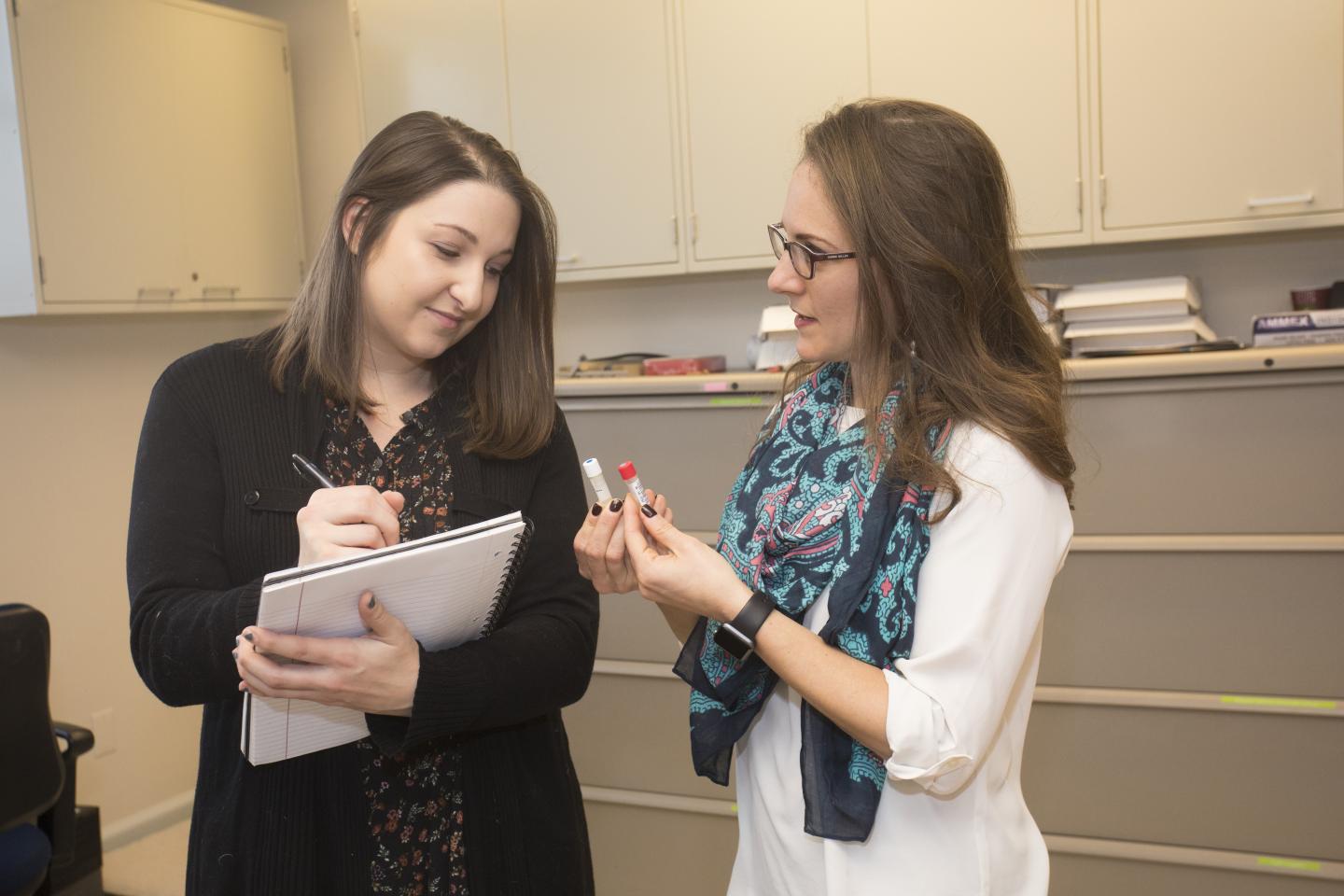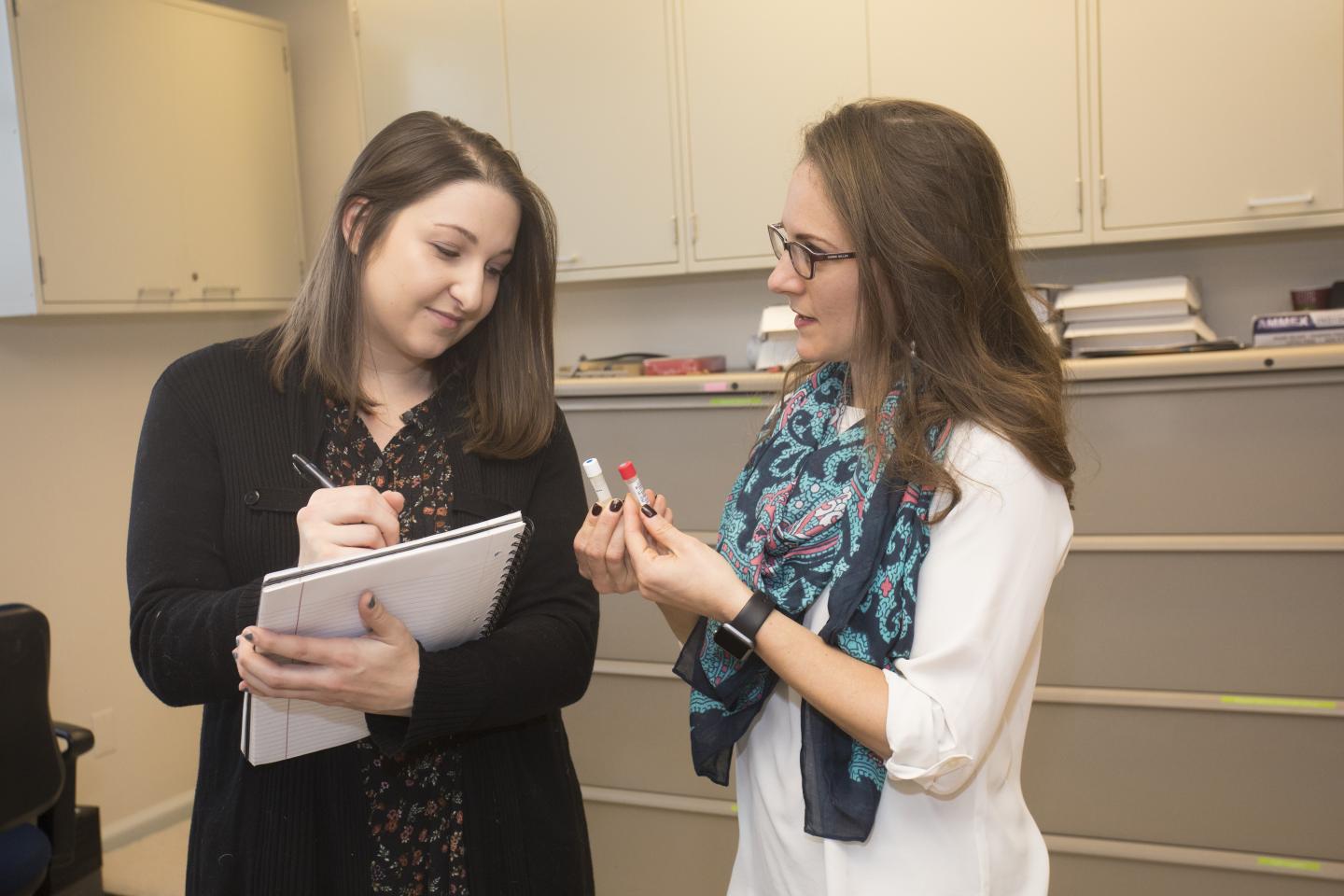
Credit: Purdue University photo/ Kevin Doerr)
WEST LAFAYETTE, Ind. — A new study shows how veterans with PTSD may benefit physiologically from using service dogs.
This study, led by the Purdue University College of Veterinary Medicine, is the first published research to use a physiological marker to define the biobehavioral effects of service dogs on veterans with PTSD.
The findings were published in the journal Psychoneuroendocrinology, and they may be significant as scientific evidence of potential mental health benefits experienced by veterans with PTSD who have service dogs.
The study was co-funded by the Human Animal Bond Research Institute (HABRI) and Bayer Animal Health. The research was led by Maggie O'Haire, assistant professor of human-animal interaction in the College of Veterinary Medicine, and Kerri Rodriguez, human-animal interaction graduate student, with the help of K9s For Warriors, an accredited nonprofit organization that provides veterans with service dogs. The study also was in collaboration with the Institute for Interdisciplinary Salivary Bioscience Research at the University of California, Irvine.
"Our long-term research goal is to quantify how service dogs may affect the health and well-being of military members and veterans with PTSD," O'Haire said. "This study compared a group of veterans with PTSD who had a service dog to a group on the waitlist to receive one. Our previous research suggests that the presence of a service dog reduced clinical PTSD symptoms and improved quality of life. In this study, we wanted to determine if those beneficial effects also included changes in the physiology of stress."
"We chose to focus our assessments on cortisol as it is a biomarker centrally involved in the stress response system," said Rodriguez, lead author on the paper. In this way, the study seeks to improve the understanding of the potential mechanisms for how and why a service dog may help this population.
Cortisol can be measured non-invasively in saliva, which enabled the veterans to collect samples themselves at home immediately after waking up in the morning and about 30 minutes later. This allowed researchers to look at how much cortisol was being produced during the morning. The magnitude of the "cortisol awakening response" has been extensively studied and is used as a metric of the effects of chronic and acute stress. Non-PTSD, healthy adults experience an increase in cortisol after waking up.
"We found that military veterans with a service dog in the home produced more cortisol in the mornings than those on the waitlist," Rodriguez said. "This pattern is closer to the cortisol profile expected in healthy adults without PTSD. Having a service dog was also associated with less anger, less anxiety, and better sleep."
O'Haire says, though, while this finding is important, it should be taken in context.
"These findings present exciting initial data regarding the physiological response to living with a service dog. However, the study did not establish a direct correlation, on an individual level, between cortisol levels and levels of PTSD symptoms, and further study is needed. It is important to keep in mind that service dogs do not appear to be a cure for PTSD," O'Haire said.
The next step, already underway, involves a large-scale National Institutes of Health clinical trial in which the researchers are studying veterans with and without service dogs over an extended period of time. "Our research team will be able to look at morning cortisol levels both before and after getting a service dog to see how these physiological effects manifest over time," O'Haire said. "The longitudinal nature of this clinical trial should bring about a better understanding of the interrelationships between physiological and behavioral processes, PTSD symptoms, and service dogs."
She also emphasizes that the participation of veterans in the studies should not be taken for granted. "We are most grateful to the military veterans and their families who have participated in the research thus far," O'Haire said. "We are honored to be collaborating with these individuals to advance the science behind our interactions with animals and how they affect human lives."
###
ABSTRACT
The Effect of a Service Dog on Salivary Cortisol Awakening Response in a Military Population with Posttraumatic Stress Disorder (PTSD)
Kerri E. Rodriguez, Crystal I. Bryce, Douglas A. Granger, Marguerite E. O'Haire
https://doi.org/10.1016/j.psyneuen.2018.04.026
Recent studies suggest a therapeutic effect of psychiatric service dogs for military veterans with posttraumatic stress disorder (PTSD), but are limited by self-report biases. The current study assessed the effect of PTSD service dogs on the salivary cortisol awakening response (CAR) and arousal-related functioning in a population of military veterans with PTSD. Participants included 73 post-9/11 military veterans with PTSD including 45 with a service dog and 28 on the waitlist to receive one. Saliva samples were collected on two consecutive weekday mornings at awakening and 30 minutes later to quantify the cortisol awakening response (CAR) and its area under the curve (AUCi) in addition to standardized survey measures of anxiety, anger, sleep quality and disturbance, and alcohol abuse. There was a significant main effect of having a service dog on both the CAR and the AUCi, with individuals with a service dog exhibiting a higher CAR and AUCi compared to those on the waitlist. Results also revealed that those with a service dog reported significantly lower anxiety, anger, and sleep disturbance as well as less alcohol abuse compared to those on the waitlist, with medium to large effect sizes. Although those with a service dog reported significantly less PTSD symptom severity, CAR was not significantly associated with PTSD symptoms within or across group. In conclusion, results indicate that the placement of a PTSD service dog may have a significant positive influence on both physiological and psychosocial indicators of wellbeing in military veterans with PTSD. Although clinical significance cannot be confirmed, a higher CAR/AUCi among those with a service dog may indicate better health and wellbeing in this population. Future within-subject, longitudinal research will be necessary to determine potential clinical significance and impact of individual differences.
Media Contact
Amy Patterson Neubert
[email protected]
765-494-9723
@PurdueUnivNews
http://www.purdue.edu/
Related Journal Article
http://dx.doi.org/10.1016/j.psyneuen.2018.04.026





